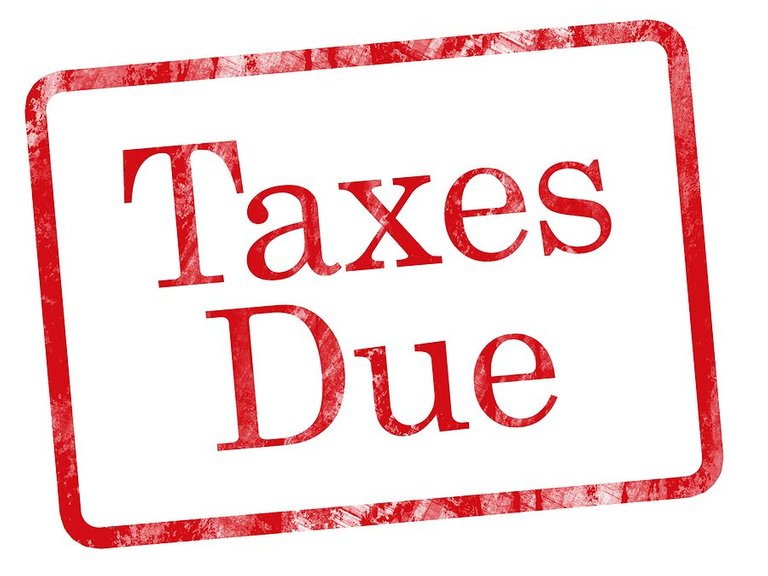Contrary to the protestations of many non-experts, the IRS guidance on cryptocurrencies (at least as far as the average person is concerned) is perfectly clear. The only true question/issue remaining is simply “What (and when) will the IRS choose (or be able) to enforce?” I will give my speculations on that question in another post (heavily referencing the current situations vis a vis barter and cryptocurrencies that do not appear on regulated exchanges) – but this post will begin to outline exactly how to calculate what the IRS claims that you owe for your participation on Steem. Much of my motivation for this post is to document what I am doing as I develop a Steem Tax Calculation application (and hopefully get feedback and/or assistance -- please let me know if you are interested in joining me in this effort).

According to the IRS, cryptocurrency is NOT currency but property (like stocks, etc.). Tax calculations and record-keeping are required *whenever* a transaction occurs which includes a regulated-exchange-traded cryptocurrency (RETC) -- BUT this does *NOT* mean that all RETC transactions are immediately taxed. Often the calculation is “merely” to determine the COST BASIS of an acquisition – which will be necessary when it is eventually exchanged, sold or transferred.
Due to the three different forms of Steem (Steem, SBD and *vests*) and the frequency of transactions, participation in the Steemit community normally ends up requiring a lot more calculations and record-keeping than other, simpler cryptocurrencies. Fortunately (or unfortunately, since the IRS can do it as well), all of these transactions are easily extracted from the Steem block-chain. Steem transactions and their tax implications include:
- Receiving any form of Steem (or any other RETC) as income for performing work (opening an account, collecting rewards, winning a contest) OR via bartering/non-like-kind exchanges, etc. – You owe income tax on the dollar value of that form of Steem (or RETC) at the time of receipt. This dollar value is also the cost basis needed to calculate your taxable profit/loss when your purchase is sold for fiat or transferred.
- Buying any form of Steem (or any other RETC) with any fiat currency (USD, euros, etc.). – The purchase establishes the cost basis of the Steem (or other cryptocurrency) as the value (in dollars) paid for it. There are no immediate tax implications.
- Trading any other RETC for Steem – Per Section 1031, the acquired batch of Steem acquires the cost basis of the traded cryptocurrency as a “like-kind exchange”. There are no immediate tax implications.
- Trading Steem for any other RETC – Per Section 1031, the acquired batch of other cryptocurrency acquires the cost basis of the traded Steem as a “like-kind exchange”. There are no immediate tax implications.
- Trading any form of Steem for any other form of Steem – exactly as in 3 and 4 above.
- Receiving any form of Steem (or any other regulated-exchange-traded cryptocurrency) as a gift – Gift tax laws are constantly changing in terms of whether there is a maximum amount after which a gift is taxable as income; however, the current situation is that there is no limit and thus, no tax implications. Once again, however, the dollar value at the time of receipt needs to be tracked as the cost basis needed to calculate your taxes when the gift is sold for fiat or transferred.
- Selling any form of Steem with any fiat currency (USD, euros, etc.) – You owe (or can reduce your) capital gains tax based upon the dollar value at the time of sale MINUS the cost basis (i.e. only on the profit/loss).
- Transferring any form of Steem for any other reason (gifting, bartering/non-like-kind exchanges, etc.) – You owe (or can reduce your) capital gains tax based upon the dollar value at the time of transfer MINUS the cost basis (i.e. only on the appreciation/depreciation).
Fortunately, for sanity’s sake, particularly worth noting is the fact that the constant inflationary increase in Steem Power, as measured in Steem, is NOT a transaction but a change in value (much as the dollar value of a given number of shares of stock in your account changes while the actual number of shares does not). This is more obvious when you view Steem Power as measured in “vests” (shares) which never change except through transactions but which have a changing Steem valuation.
https://steemit.com/taxes/@mynameisbrian/steem-taxes) or even the averaged Steem feed AS LONG AS the same feed and calculations are always used (at this point, I’m considering the last for my application initially and possibly several choices eventually). Unfortunately, determining the type of transaction (i.e. what the Steem was traded for) doesn't appear as simple to determine in many cases. Hopefully my effort to create a tax calculator will also lead to community-wide standards that will make it easier to retrieve this information from the block-chain.For each transaction in the Steem block-chain, the type of transaction (an exchange, a gift, income/barter, purchase or sale) must be determined and possibly a dollar value must be calculated from the current value of Steem. When necessary, that dollar value can be drawn from the feed of any exchange, coinmarketcap.com (per @mynameisbrian in
Image Source: The Budgetnista Blog
Minnow Post of the Day: A Puzzle from Hell - Two Lucky Winners will get 5 SBD each!
click here!This post received a 10% upvote from @randowhale thanks to @mark-waser! For more information,
Thank you very much for the tips, it will help a lot beginners like me! Have a great day
Thanks Resteemed
https://cointracking.info/dashboard.php
This is a good way to track
Mark,
What do you think of this person's method of calculating taxes?
https://steemit.com/steemit/@jerrybanfield/steemit-tax-calculation-and-payment-system
Are you still looking for a steemit tax calculation app? Have you found one or are you building one? I was going to research it a bit. I am really only interested in US taxes personally.
I am wondering if starting an LLC would help simplify the tax situation with earnings from steemit.